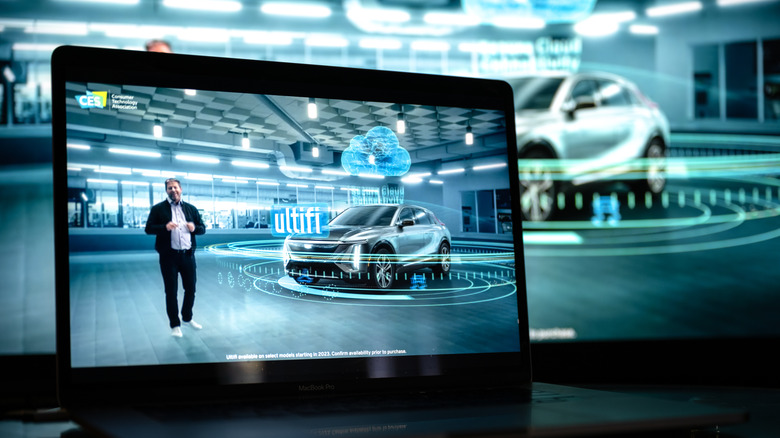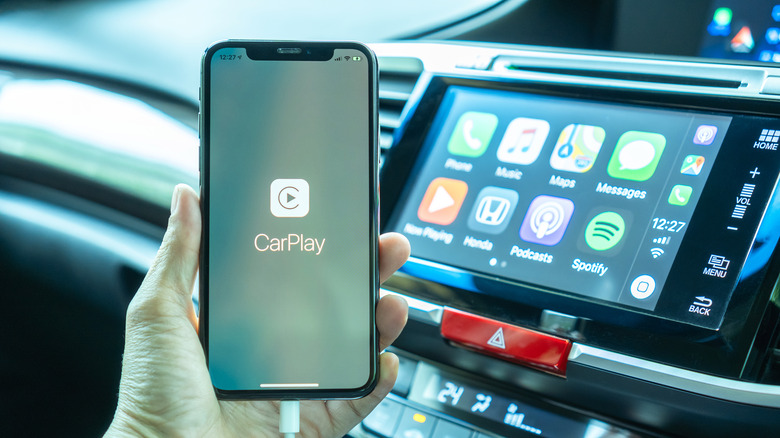GM Is Getting Rid Of Apple CarPlay And Android Auto For Good: Here's Why
Update 12/13/2023: After publishing this article, a representative for GM reached out to SlashGear claiming that the company's position on phone projection was "misrepresented" by MotorTrend. "We wanted to reach out to clarify that comments about GM's position on phone projection were misrepresented and to reinforce our valued partnerships with Apple and Google and each company's commitment to driver safety," the company said. "GM's embedded infotainment strategy is driven by the benefits of having a system that allows for greater integration with the larger GM ecosystem and vehicles."
Earlier this year, General Motors announced the controversial decision to ditch Apple CarPlay and Google's Android Auto from its upcoming fleet of electric cars. The decision didn't sit well with a lot of folks. Even Volvo CEO Jim Rowan called out GM, noting that it wasn't the right approach. "You've got to figure out where you spend your engineering dollars and what benefit that brings to the customer or the shareholders."
GM Chief Tim Babbitt has now offered an explanation behind the contentious move, telling Motor Trend that it had more to do with the safety and reliability of Apple and Google's in-car solutions than trying to lock users into its own digital infotainment ecosystem. "According to Babbitt, CarPlay and Android Auto have stability issues that manifest themselves as bad connections, poor rendering, slow responses, and dropped connections," says the report.
Babbitt went on to explain that when CarPlay and Android Auto are not working as intended, the driver naturally turns their attention back to their smartphones, which is unsafe. There is definitely automobile research literature out there backing Babbitt's concerns. According to a paper published in the Journal of Radiation Research and Applied Sciences, a majority of drivers turn their attention to smartphones while driving in order to attend calls, sending messages, or even scrolling social media — all three of which have become the core utility for modern-age smartphones, but simultaneously pose safety hazards when the driver isn't able to react in time.
GM hopes to be more reliable
Stressing the reliability aspect of CarPlay and Android Auto, Babbitt notes that solving the failures of these programs is beyond the carmaker's control. Additionally, when such reliability issues arise, they defeat the whole purpose of having them in the first place, as the driver eventually turns their attention to the smartphone. GM is essentially banking on the idea of removing smartphones from the equation while simultaneously hoping that its own "Ultifi" in-car infotainment system doesn't come with any reliability issues.
Regarding the GM chief's concerns about reliability-related risks, another research published in the Psychological Risk Factors for Road Safety journal "confirmed the impairments associated with the use of mobile phones among young drivers leading to poor control of the vehicle." But irrespective of what external research says, going all-in on its own solution is a huge bet, especially considering the fact that GM itself hasn't tested the theory in lab or real-world scenarios and is simply going by the promise of "high potential." That could very well backfire spectacularly. Plus, there's a reason every other carmaker is putting their trust in Apple and Google, while GM is choosing the hard road of slow and expensive R&D to create its very own infotainment kit that would supposedly solve the phone-fueled driver distraction woes.
The ulterior motives with Ultifi
Babbitt also highlights the crucial problem of phone compatibility, especially with Android phones that want to blend seamlessly with a car's infotainment system. The GM executive also highlighted that common complaint culprits are Android Auto and CarPlay, but owners often blamed the carmaker for those issues. Once again, scientific research validates Babbitt's concerns. A study at the National Library of Medicine repository analyzed driver data and found a "strong correlation between distracted operations and driving control behavior."
GM is hoping that a native digital infotainment system could bring down the bad consumer perception towards its cars down the road. But it's hard to ignore GM's subtle attempt at ecosystem locking. Yes, it can solve the feature gulf by bringing core services like Google Maps and music streaming to its own Ultifi software. Still, in doing so, GM might also offload a handful of operations you would otherwise accomplish on a phone. If the current trend of locking car features behind a subscription is anything to go by, GM's plans don't instill much faith.
Unfortunately, such a future seems to be on GM's roadmap. "In addition to potentially buying things from GM or GM's partners through their car's infotainment system, GM is also looking at subscription services that would be managed through the same interface," says the Motor Trend report. On a positive note, a native infotainment system will offer GM access to more driver data that could speed up bug resolution and refine the whole system.


